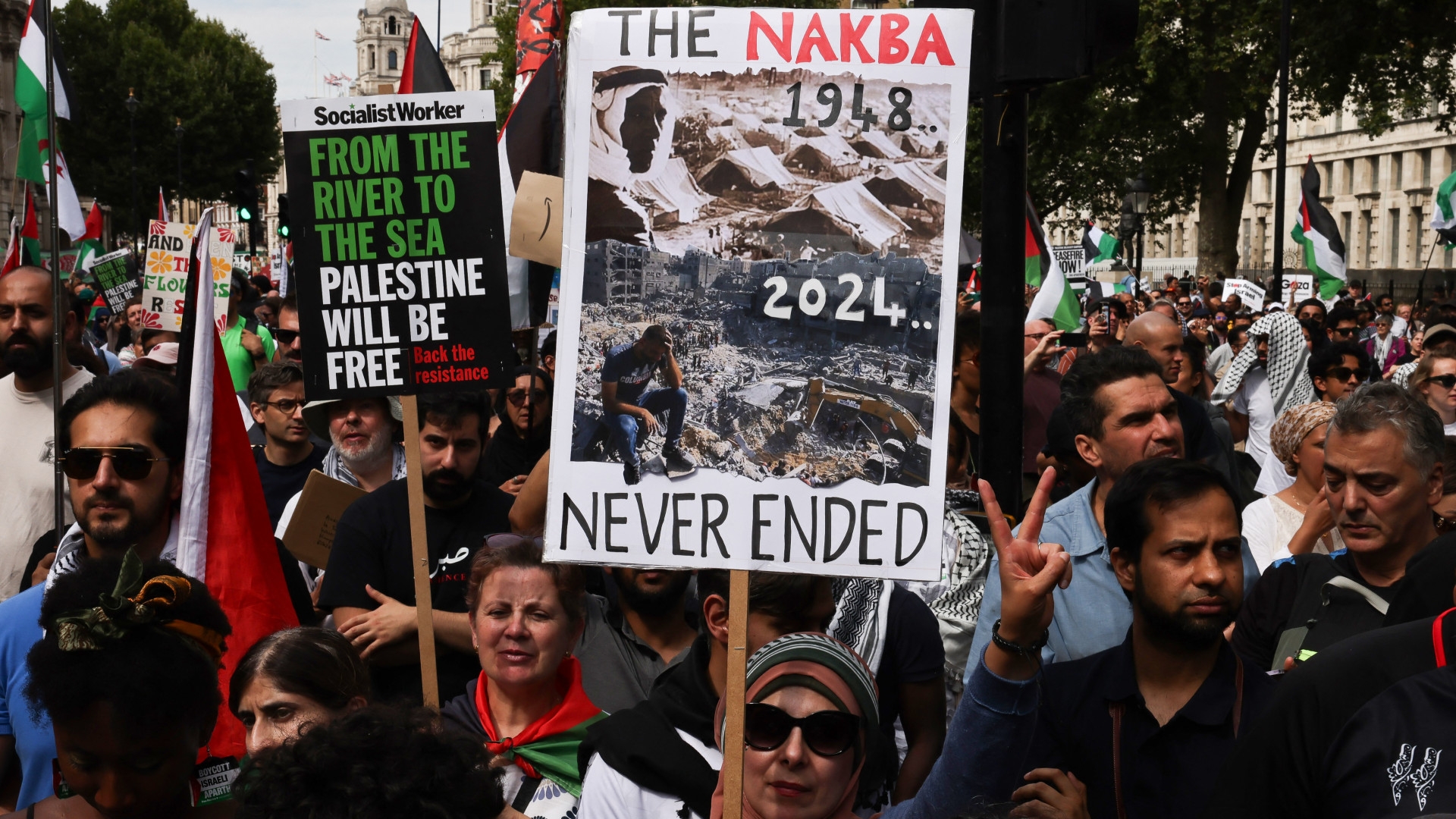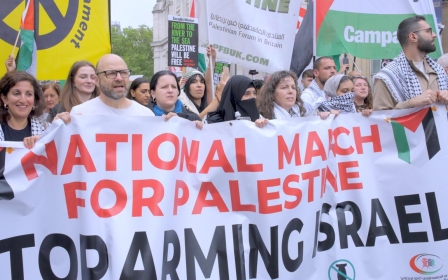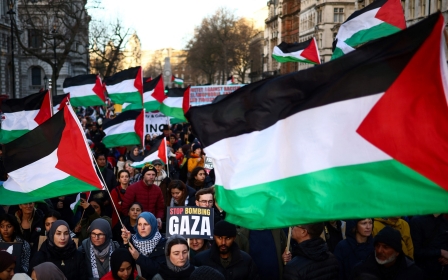One year on, the UK must end its complicity in Israel's genocide

On 7 October 2023, we woke up to images of resistance fighters infiltrating the separation fence that imprisons Palestinians in the Gaza Strip.
Days of chaos ensued as Israel sought to regain control and re-establish its image of omnipotence.
A year on, Israel is still punishing the Palestinian people for refusing to leave or die quietly. It is also spreading its indiscriminate violence across the region (in Lebanon, Syria, Yemen, Iraq and Iran) to anyone who dares to challenge its dominance.
As we approach the grim one-year anniversary of the genocide, it is an opportunity for us to reflect and renew our commitment to the Palestinians and their quest for liberation.
This Saturday, thousands of people will participate in a national march in central London. It will be a show of force to remind our government that the British public will not stand by while the government fails to uphold its moral and international obligations.
New MEE newsletter: Jerusalem Dispatch
Sign up to get the latest insights and analysis on Israel-Palestine, alongside Turkey Unpacked and other MEE newsletters
It will be an act of solidarity with the people of Palestine, Lebanon and the region and a clear message that we refuse to normalise Israel's crimes.
It is a commitment that we will continue to mobilise until the UK stops arming Israel, the people of the region are allowed to live in peace and security, and the Palestinian people are granted their right to self-determination.
Historical crimes
For the casual observer whose image of Israel is primarily shaped by their propaganda, relayed through politicians and media in the West, Israel's actions over the past year may have come as a surprise.
How could this island of "tolerance" in a sea of intolerance kill at least 42,000 Palestinians, around 90 percent of whom are civilians and 33 percent children?
Given its legacy, perhaps we would be forgiven for thinking that Britain would want to correct this historical wrong done to the land's indigenous population, the Palestinians
How could it so blatantly violate international human rights law by cutting off humanitarian aid, bombing hospitals and schools, and destroying all 12 of Gaza's universities?
How could the "only democracy in the Middle East" kill at least 172 journalists, deliberately target their families, and not allow any international media into Gaza?
How can this society, which shares our "western values", be descending into fascism before our eyes - openly celebrating and advocating for the mass extermination of Arabs?
Those familiar with the Zionist ideology that underpins Israelis' presence in Palestine, however, will find it easy to understand. Many of the founding fathers of Zionism, including David Ben-Gurion, who headed the Jewish Agency and became the first prime minister of Israel, openly advocated for territorial expansion and the displacement of Palestinians (through force if necessary).
The 1948 Nakba was the first enactment of this ambition, where Zionist, terrorist gangs (which would later become the Israeli military) displaced 750,000 Palestinians. When Israelis call for "Nakba 2.0" in Gaza, it is simply an attempt to finish the job.
Given Israel's history, built as it is on a racist, settler-colonial ideology, the genocide in Gaza is entirely consistent with Zionism's internal logic. Indeed, Palestinian scholars have long considered the Nakba to be an ongoing process rather than a single event.
Follow Middle East Eye's live coverage of the Israel-Palestine war
The occupation of the entirety of the West Bank, East Jerusalem, and Gaza Strip in 1967; the expansion of Jewish settlements and land grabs; the subjugation of the Palestinian population through apartheid policies, house demolitions and arbitrary detention; and the complete air, sea and land blockade of the Gaza Strip since 2007 can all be interpreted as episodes in Israel's attempt to remove the Palestinians from their land and realise their ambitions for a Jewish state over the entirety of historic Palestine.
Of course, the British government has played a historical role in creating the "Palestinian problem". Through the Balfour Declaration of November 1917, then-Foreign Secretary Arthur Balfour promised support for the Zionist movement in establishing "a national home for the Jewish people" in Palestine.
This policy was put into action under the British Mandate period that followed the end of World War One.
Given this legacy, perhaps we would be forgiven for thinking that Britain would want to correct this historical wrong done to the land's indigenous population, the Palestinians. Unfortunately, this has not been the case.
UK complicity
The past year has been a turbulent time for UK politics, and throughout this, the spectre of the Gaza genocide has loomed large.
It became an illustration of the moral malaise of the political establishment, which, in the face of unprecedented public mobilisation, continued to stand side-by-side with Israel and its apparently unfettered "right to defend itself".
Keir Starmer's support for Israel's 'right' to withhold power and water from Palestinians became symbolic of a party that lacked courage
The Conservative Party, instead of acknowledging the weight of public opinion, led a witch hunt against pro-Palestine protesters and promoted unsubstantiated claims of antisemitism, violence and extremism.
They provided Israel with unconditional military and diplomatic support, cut aid to Unrwa, and submitted a legal objection to the International Criminal Court (ICC) arrest warrants against Israeli leaders, all while refusing to consider an arms embargo or call for a permanent ceasefire.
Labour, while in opposition, did not fare much better. Prime Minister Keir Starmer's support for Israel's "right" to withhold power and water from Palestinian civilians became symbolic of a party that lacked the courage to take a firm stance.
The backlash came to the fore in July when candidates running on pro-Palestine platforms defeated Labour candidates at the elections or caused their vote share to drop in many previously safe seats.
These shockwaves were apparently not enough to trigger a change in approach from Labour once they came into power. Images of dead children or destroyed houses were apparently not enough to dent the euphoria of ending fourteen years in opposition.
Although Labour did drop the objection to the ICC arrest warrants and reinstate funding to Unrwa, this does not even suffice as the bare minimum or put any meaningful pressure on Israel to end its genocide.
The continuation of licences for arms exports - of which only 30 out of 350 were suspended - and diplomatic support - by refusing to vote in favour of a UN General Assembly in September which called on Israel to end its occupation - means that the UK remains complicit.
After nearly 365 days of seeing Israeli violence live-streamed, it is easy for Palestinian suffering to become normalised - a danger only exacerbated by decades of dehumanisation of Arab and Muslim life.
The global Palestine solidarity movement has pushed back against this urge and the continuous attempts to undermine and downplay Israel's genocide. Now, as it steps up its war on Lebanon, we are reminded of the dangers posed by appeasement.
With the threat of all-out regional war looming, it is more important than ever that we pressure the UK government to end its complicity in Israeli crimes.
The views expressed in this article belong to the author and do not necessarily reflect the editorial policy of Middle East Eye.
Middle East Eye delivers independent and unrivalled coverage and analysis of the Middle East, North Africa and beyond. To learn more about republishing this content and the associated fees, please fill out this form. More about MEE can be found here.






